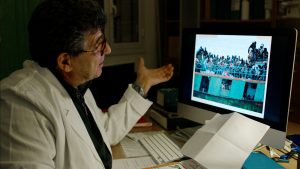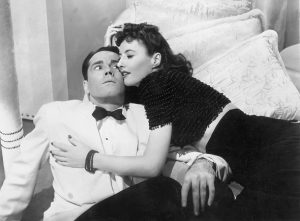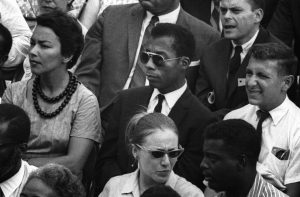FIRE AT SEA – Area Premiere!
Gianfranco Rosi (Italy/France 2016) 108 min. DCP. Italian with English subtitles.
The first documentary to ever win the top award at the Berlin International Film Festival, Fire at Sea takes place in Lampedusa, a once peaceful Mediterranean island that has become a major entry point for African refugees into Europe. There, we meet Samuele, a 12-year-old boy who lives simply, climbing rocks by the shore and playing with his slingshot. We also witness thousands of men, women and children trying to survive the crossing from Africa in boats that are too small for such a journey. Gianfranco Rosi provocatively places these realities side by side, and in so doing creates a remarkable third narrative that jolts us into a new understanding of what is happening in the Mediterranean today.
“I’m not sure that Mr. Rosi is interested in trafficking in hope, which is among his great virtues as a filmmaker. He takes a hard, empathetic look at reality, which contains wonders as well as horrors. He doesn’t bear witness — an overused and often presumptuous idea. He observes, with humility and precision. Instead of raising awareness, he cultivates alertness. Fire at Sea occupies your consciousness like a nightmare…” – A.O. Scott, New York Times
TOP OF PAGE
Tuesday, January 24 at 7pm

THE HANDMAIDEN – Area Premiere!
Chan-wook Park (Korea 2016) 144 min. DCP. With Kim Min-hee, Kim Tae-ri, Ha Jung-woo. Korean and Japanese with English subtitles.
From Park Chan-wook, the celebrated director of Oldboy, Lady Vengeance and Stoker, comes a ravishing new film inspired by British author Sarah Watersequal’s novel Fingersmith and set in Japanese-occupied Korea in the 1930s. Equal parts crime drama and erotica, the story chronicles the relationship between a young Japanese Lady living on a secluded estate and a Korean woman hired as her handmaiden. Park is known for his explicit portrayal of perversity and terror in previous films, and boasts in The Handmaiden a deft understanding of the gaze and tropes tangled up in the cinematic representation of female sexuality. Yet his boldest gesture in this film might be the depiction of the source of its power: the intimacy and miracle of a magnificent romance.
“The Handmaiden contains multitudes: It’s a sumptuous romantic period piece, as well as a sexy spy thriller, replete with secret identities and triple-crosses. It’s an extended commentary on Japan’s occupation of Korea in the 1930s, and it’s an intense piece of psychological horror from one of the masters of the genre, Park Chan-wook. But more than anything, The Handmaiden is just pure cinema, a dizzying, disturbing fable of love and betrayal that piles on luxurious imagery, while never losing track of its story’s human core.” – David Sims, The Atlantic
TOP OF PAGE
Tuesday, January 31 at 7pm

LOS SURES
Diego Echeverria (U.S. 1984) 60 min. DCP.
Thirty years ago, the now fully gentrified New York City neighborhood of South Williamsburg was known as “Los Sures,” a place imbued with the vibrant life and community of close-knit Puerto Rican and Dominican families living amidst everyday economic struggle. Diego Echeverria’s essential documentary brings the lost world of the early 80s back to life; through the eyes of five individuals, Los Sures represents the challenges residents of the Southside faced (poverty, drugs, gang violence, abandoned real estate, racial tension and inadequate local resources) as well as the strength of the community’s culture, creativity and determination to overcome a desperate situation. Rediscovered in 2007, the film has become a cornerstone program of the Williamsburg arts nonprofit UnionDocs, which restored the film and in 2010 began the “Living Los Sures” historical memory project; a short film from this project, Of Memory & Los Sures (2011, 15 minutes), will accompany the screening of the documentary. Co-presented with the Center for the Study of Race, Ethnicity, and Gender (CSREG). Introduced by Elena Machado, Professor of English.
TOP OF PAGE
Tuesday, February 7 at 7pm
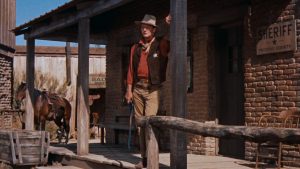
RIO BRAVO – Digital Restoration!
Howard Hawks (U.S. 1959) 141 min. DCP. With John Wayne, Dean Martin, Walter Brennan, Angie Dickinson, Ricky Nelson.
Rio Bravo was Howard Hawks’ answer to High Noon, the 1952 western in which Gary Cooper spends two hours of reel time trying in vain to roust the citizenry to help him exterminate the town skunk. “Now, that’s a rather silly thing for a man to do,” said Hawks, “especially since at the end of the picture he is able to do the job himself. So I said, we’ll do just the opposite, and take a real professional viewpoint.” As John T. Chance, sheriff of a tiny Texas bordertown, Wayne’s job is to keep a jailed killer in, and his cohorts – who have the town surrounded – out. But he doesn’t do it alone. During the course of events he is saved or protected by a reformed drunk (Martin at his finest), a gimp-legged old geezer (Brennan), a dance-hall gal with a past (Dickinson) and a singin’ cowboy (Nelson) with a future. (Adapted from Pacific Film Archive Program Notes) Introduced by Alf Siewers, Professor of English.
“If I were asked to choose a film that would justify the existence of Hollywood, I think it would be Rio Bravo.” – Robin Wood, Howard Hawks
TOP OF PAGE
Tuesday, February 14 at 7pm
THE LADY EVE
Preston Sturges (U.S. 1941) 94 min. 35MM. With Barbara Stanwyck, Henry Fonda, Charles Coburn.
What better way to spend Valentine’s Day than with a screwball comedy, sweetened with Henry Fonda’s clueless bewilderment and spiced with Barbara Stanwyck’s seductress wiles. He’s a virgin ophiologist, she a beautiful grifter; upon their meeting at a cruiseship card table, Fonda innocently (lustfully?) says, “You’re a funny girl for anybody to meet who’s just been up the Amazon for a year.” Preston Sturges, the sophisticated auteur of fast-paced, witty, wry but ultimately tender hearted movies, effortlessly mixes slapstick and sexy in one of his most clever and beloved romantic comedies.
TOP OF PAGE
Tuesday, February 21 at 7pm
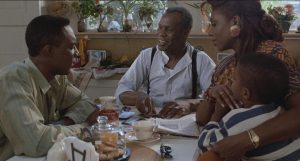
TO SLEEP WITH ANGER – Studio Restoration!
Charles Burnett (U.S. 1990) 102 min. DCP. With Danny Glover, Richard Brooks, Mary Alice, Carl Lumbly.
Charles Burnett’s first feature to be widely released by a major distributor features an ensemble cast headed by the film’s executive producer, actor Danny Glover, and concerns a transplanted African American family’s metaphorical and metaphysical tug-of-war between their comfortable life in Los Angeles and the age-old superstitions and cultural traditions native to their former home in the South. Within this framework, Burnett incisively examines the complexities of modern middle-class Black life amid the challenges of reconciling the past with the present. The result is an indelibly humanistic fable, rich in poetic symbolism and firmly grounded in a recognizable reality. (Adapted from Mark Quigley’s UCLA Program Notes) Co-presented with Bucknell’s office of Diversity & Inclusion.
TOP OF PAGE
Tuesday, February 28 at 7pm

FOREIGN PARTS
J.P. Sniadecki and Véréna Paravel (U.S. 2010) 80 min. DCP.
Foreign Parts observes and captures the struggle of a contested “eminent domain” neighborhood before its disappearance under the capitalization of New York’s urban ecology. In the first years of the new century, the hidden enclave of Willets Point found itself in the shadow of the New York Mets’ new stadium, and thus fated for demolition. Filled with scrap yards and auto salvage shops, lacking sidewalks or sewage lines, the industrial zone was home to a strange community where wrecks, refuse and recycling form a thriving commerce. Foreign Parts observes its culture and gives voice to people like Willets’ last original resident, trying to contest his imminent eviction, and two lovers struggling through the winter while living in an abandoned van.. Co-presented with Bucknell’s Department of Sociology & Anthropology. Introduced by Postdoctoral Fellow Jason Alley.
TOP OF PAGE
Tuesday, March 7 at 7pm

MEDICINE FOR MELANCHOLY – Director Barry Jenkins Appearing at Bucknell March 28th!
Barry Jenkins (U.S. 2009) 88 min. With Wyatt Cenac, Tracey Heggins. DCP.
The acclaimed first feature by the celebrated director of Moonlight is a “bittersweet paean to San Francisco and its indie scene… a vivid semi-love story and a contemplation of race and gentrification in the city” (IFC). Barry Jenkins’ assured debut raises the stakes of a familiar 21st century genre (lovers spend a day wandering the city together) by imbuing ‘Jo (Heggins) and Micah’s (Cenac) brief affair with ruminative socio-political questions. Micah’s melancholy musings about love and race relations, and the erasure of African-American identity in urban hipsterdom, are accentuated during the couple’s visit to the Museum of the African Diaspora – one of several scenes that foreground Jenkins’ “self-awareness, and self-questioning [in] this small, incisive film” (New York Times). Co-presented with Bucknell’s office of Diversity & Inclusion.
“Like so many movies about 20-something urbanites Medicine for Melancholy concerns the search for self-definition. But it stands apart for its forthright attention to the push-pull of inclusion and exclusion that comes with being a minority member of a subculture. … The characters keep circling back to questions of race and assimilation, but the film is less an identity-politics polemic than a credible portrait of a young man wrestling with those issues.” – Dennis Lim, The New York Times
Tuesday, March 21 at 7pm

LEVIATHAN – Sound Designer Ernst Karel in Person!
Lucien Castaing-Taylor and Verena Paravel (U.S. 2012) 87 min. DCP.
One of the most critically-acclaimed documentaries in recent years, Leviathan is an immersive portrait of the contemporary commercial fishing industry. Filmed off the coast of New Bedford, Massachusetts – once the whaling capital of the world (and Melville’s inspiration for Moby Dick), today the country’s largest fishing port – Leviathan follows a hulking groundfish trawler on a weeks-long expedition. But instead of romanticizing labor or partaking in the longstanding tradition of turning fisherfolk into images, filmmakers Lucien Castaing-Taylor and Véréna Paravel employed an arsenal of cameras (passed from film crew to ship crew) that swoop and soar; collaborating with sound artist Ernst Karel they designed an intense aural cataclysm that swallows the viewer whole. Leviathan, the most famous film to come out of Harvard’s Sensory Ethnography Lab, is an audio-visual experience that broke new ground in both cinema and anthropology. It is unlike anything that has been seen or heard before–a viscerally sensorial representation of work, sea, machinery and human and marine players. The screening will be preceded by the presentation of Karel’s recent sound composition, Morning and Other Times (7.1 audio, 2014). Co-sponsored by the University Lectureship Committee.
AFTER COAL
Tom Hansell (U.S. 2016) 60 min.
This hour long documentary invites viewers to the front lines of the transition away from fossil fuels, profiling inspiring individuals who are building a new future in the coalfields of eastern Kentucky and South Wales. Co-presented by Bucknell’s Center for Sustainability and the Environment and the Weis Center for the Performing Arts, in conjunction with the year-long interdisciplinary project “Coal Collections: Local, National, and International Stories.” Introduced by Shaunna Barnhart, Director of the Place Studies Program.
CERTAIN WOMEN – Area Premiere!
Kelly Reichardt (U.S. 2016) 107 min. With Kristen Stewart, Michelle Williams, Laura Dern. DCP.
Kelly Reichardt (Wendy and Lucy, Meek’s Cutoff) is one of America’s foremost contemporary filmmakers, an independent female director forging a body of work about the American Northwest and centered around strong women looking for ways to understand and shape the world around them. Her latest film, based on short stories by Montana-based author Maile Meloy, brings together a remarkable ensemble cast in a sequence of stirring character studies of women in transition: a lawyer (Dern) contending with both office sexism and a hostage situation; a wife and mother (Williams) whose determination to build her dream home puts her at odds with the men in her life; and a young law student (Stewart) who forms an ambiguous bond with a lonely ranch hand. April 11
Reichardt is “a poet of the space between words, and the hypnotic and haunting Certain Women presents the writer-director at her artfully attentive best.” – Peter Travers, Rolling Stone
I AM NOT YOUR NEGRO–Area Premiere!
Raoul Peck (U.S./France/Belgium/Switzerland 2016) 93 min. DCP.
In 1979, James Baldwin wrote a letter to his literary agent describing his next project, Remember This House. The book was to be a revolutionary, personal account of the lives and successive assassinations of three of his close friends: Medgar Evers, Malcolm X and Martin Luther King, Jr. In his incendiary new documentary (an Academy Award nominee for Best Documentary Feature), Haitian filmmaker Raoul Peck has taken the 30 completed pages of Baldwin’s unfinished manuscript and crafted an elegant and bracing film essay examining the tragic state of race in America. Using Baldwin’s original words and a flood of rich archival material, Peck connects the past of the Civil Rights movement to the present of #BlackLivesMatter, questioning black representation in Hollywood and beyond. Co-presented by Bucknell’s Africana Studies Program. Introduced by P. Khalil Saucier, Associate Professor and Director of Africana Studies.
THE OTHER SIDE
Roberto Minervini (France/Italy 2015) 92 min. DCP.
After completing his Texas trilogy (with Stop the Pounding Heart, screened in the Tuesday Series last fall), Robert Minervini went deeper still into the margins of American society, revealing citizens of this country rarely seen onscreen. In the Deep South he found wounded communities facing the threat of being forgotten by political institutions: disarmed veterans, drug addicts trying to escape addiction through love and ex-special forces soldiers still at war with the world – a hidden pocket of humanity that through Minervini’s sometimes detached, sometimes lyrical, lens opens a window to the abyss of today’s America. Co-presented by Bucknell’s Center for the Study of Race, Ethnicity and Gender.
“Donald Trump’s victory did not come as a surprise to me. If anything, I expected him to win by a larger margin than he actually did. For the past eight years of the Obama administration, I have been closely observing the germination and proliferation of right-wing grassroots movements in America… As a filmmaker, I can’t help but consider how cinema has been reacting to this whole political bedlam. The political apathy that permeates the contemporary film world is nothing new, and I am not going to comment on that. But what really worries me is the surge of a new wave of philistine cinema, which is producing covert-yet-not-so-subtle nationalistic, reactionary work, sugar-coated with the recipe of mainstream productions.” – Roberto Minervini, Cinema Scope
